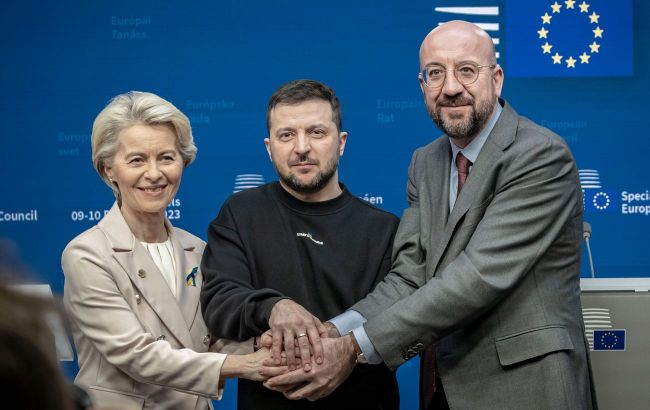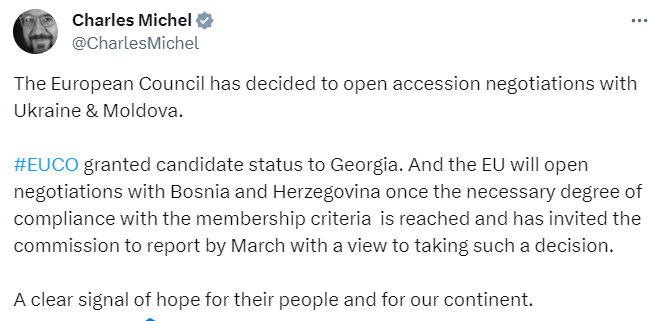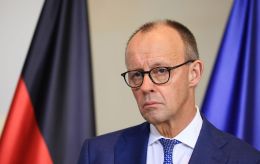Ukraine's EU accession talks greenlighted: What's next
 Volodymyr Zelenskyy, Ursula von der Leyen, and Charles Michel (Photo: Getty Images)
Volodymyr Zelenskyy, Ursula von der Leyen, and Charles Michel (Photo: Getty Images)
The European Council supported the start of negotiations with Ukraine for EU accession during the summit in Brussels. However, Ukraine faces a challenging and lengthy process ahead.
Find out more about what EU accession negotiations entail and when they might commence in the following material from RBC-Ukraine.
The material includes statements from Ukrainian and European officials, previous articles from RBC-Ukraine, and an exclusive comment from the Chair of the Verkhovna Rada Committee on Foreign Policy, Oleksandr Merezhko.
The leaders of EU member states gathered today at the Brussels summit and officially gave the green light to commence accession negotiations with Ukraine. Notably, negotiations were also approved with Moldova, while Georgia finally obtained candidate status for EU accession.
"(This is - Ed.) a strategic decision and a day that will remain engraved in the history of our Union Proud that we have lived up to our promises and delighted for our partners," Ursula von der Leyen, President of the European Commission has stated.
This decision was not hindered by Hungary's position, which threatened to block the start of negotiations with Ukraine. According to Western media reports, Hungarian Prime Minister Viktor Orbán even left the summit room before the vote on the Ukrainian issue. Orbán explained his departure in a statement on his Facebook page, labeling Ukraine's EU membership as a "bad decision" in which Hungary does not wish to participate.
What are EU accession negotiations?
Following the European Council's decision in Brussels, a negotiating framework must now be formed, outlining the procedure for accession negotiations with Ukraine. It is expected that work on the framework will commence immediately, with its approval anticipated in March of the coming year.
"We will open negotiations and a report will be issued in March, and based on that we will make a decision in March," said Charles Michel, President of the European Council, to journalists on the sidelines of the Brussels summit, emphasizing that it was a very powerful political signal and a very powerful political decision.

Photo: The European Council has given the "green light" for negotiations with Ukraine (Getty Images)
As part of the accession negotiations, Ukraine will need to harmonize its legislation with that of the European Union by adhering to the so-called Acquis Communautaire – a set of rights and obligations of EU member states.
This Acquis Communautaire consists of 35 individual segments, and progress in each area must be unanimously approved by all EU members. However, a separate negotiation framework is developed for each candidate country, and certain procedural aspects might be simplified in Ukraine's case.
The Acquis Communautaire covers various aspects including free trade, intellectual property rights, competition policy, fisheries, energy, taxation, judiciary, education, culture, financial control, and more. In total, for Ukraine to gain membership, it needs to implement around 30,000 different EU rules and standards.
"We will need to adapt our legal system to the Acquis Communautaire, the EU legal system, which includes not only thousands of pages of EU treaties and other legal sources but also the political principles on which the EU is based," explains Oleksandr Merezhko, Chair of the Parliamentary Committee on Foreign Policy, in a comment to RBC-Ukraine.
Merezhko notes that accession negotiations could take several years; in some cases, negotiations lasted 4-5 years. However, he believes that in Ukraine's case, the negotiation process might be shorter.
When can Ukraine become a member of the EU?
As for Ukraine's potential EU membership, the duration of negotiations primarily depends on how quickly the necessary reforms are implemented by the Ukrainian government. Additionally, the political will of the EU will play a significant role in this process since progress on each point must be approved by all EU countries.
It's important to note that negotiations are not the final step towards EU membership. In the event of successful conclusion and support from the European Council, European Commission, and European Parliament, all 27 EU countries must sign and ratify the membership agreement with Ukraine (in some cases, a national referendum may be required).
2030 has been outlined in the EU as a tentative timeframe for its expansion, expecting nine countries, including Ukraine, to join the bloc. However, this doesn't mean that Ukrainians will have to wait until 2030 to become part of the EU.
In early October, the EU's High Representative for Foreign Affairs, Josep Borrell, stated that Ukraine could expedite the process of new members' accession, and the previously mentioned 2030 timeframe is merely a guideline. This position was also expressed by Vice Prime Minister for European Integration Olha Stefanishyna in a comment to RBC-Ukraine. She explained that EU enlargement would not happen "overnight" as each country would have an individual approach, considering the pace of its transformation.

